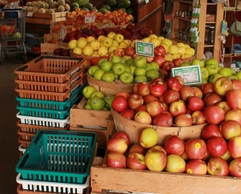Guelph Food Hub Aims to Connect Farmers and Consumers

GUELPH, Ontario, Canada — The Guelph Wellington Community Co-op is launching an online "food hub" to connect local farmers and gardeners directly with consumers.
President Andrew Eisen said the hub is designed to "bridge the gap between the right decision and the affordable decision."
"We're owned by our producers, consumers and workers," he said.
The hub is the product of a few years work and the co-op members hope to have the website running by their first general members meeting on Saturday.
Once the site is online, members of the co-op will be able to order food from local farmers and gardeners and other members of the co-op will deliver it.
The idea is to be as cheap as possible while leaving the smallest carbon footprint, Eisen said.
Members buy shares, about $40 each for consumers, and are paid back if the co-op makes a profit from them, said Eisen.
They will also have ways for low-income people to participate, by creating volunteer opportunities to earn credits that can be spent in the co-op, he said.
The co-op already has about 22 members and Eisen is hoping to recruit more.
Eisen described the co-op model as "sort of in between conventional thinking with for profits or nonprofits," and said the food hub should appeal to "anybody concerned with slow food, ethical food and local practices."
Eisen said they are basing the idea off successful food co-ops in Toronto and Oklahoma and across Ontario.
"There's quite a story in what's happening all around the province right now with the Local Organic Food Co-op Network," he said.
That network is designed as a platform for different local co-ops to share information and collaborate.
"All of us are unique co-ops and autonomous and designed to fit our own area, but a lot of us are following in line with this type of system," said Eisen.
Kat Granger grows vegetables and is one of the co-op's producers.
"Our community has so many people that have so many talents and it's just an untapped resource," she said.
The producers will all have their own profiles on the website so that consumers can see exactly how the food was grown. Whether or not, for example, it's organic.
"This is a vehicle for you to do what you normally do, you're buying food anyway," said Granger of the food hub.
"Your food dollar is so massively important, where you spend it," she added.
"When you start thinking about it, how it ripples out and what if affects, it's actually mind-boggling."
The co-op is "starting small" with the food hub, but Granger and Eisen said there is plenty of room for expansion.
A potential Phase 2 includes plans for access to cold storage and processing. But it will be driven by what the members want, said Granger.
"It's not cut in stone. It is whatever the members want it to be and to do," she said.







